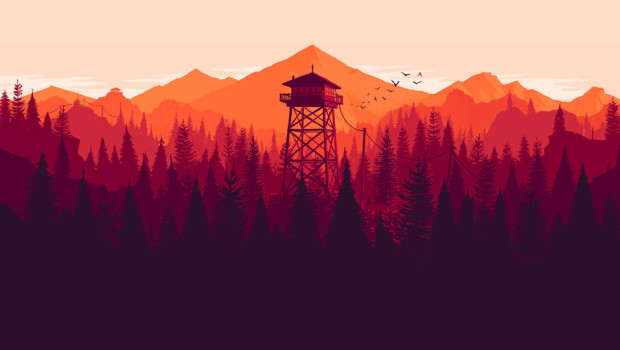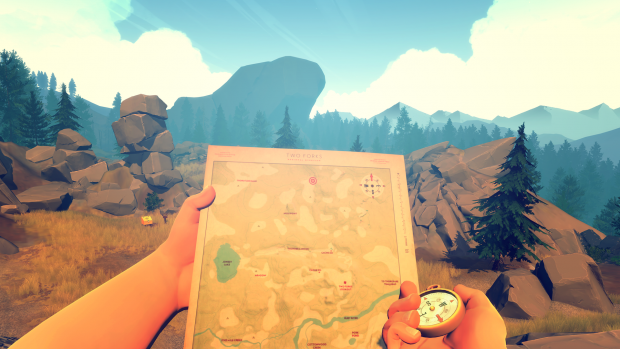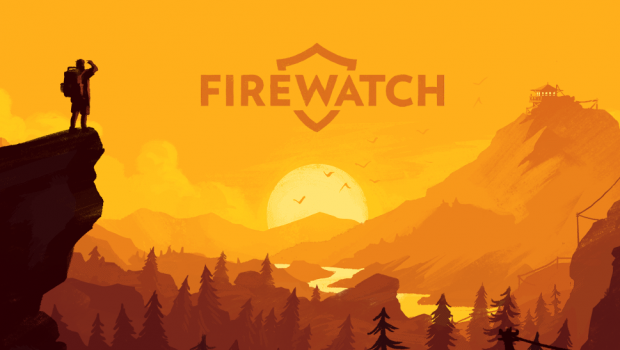What is Firewatch? That’s a question jokesters on the internet have been asking for some time. This is due to the secrecy developer Campo Santo gave the game during marketing and previews. Without giving much away, you play as Henry. Henry’s become a fire watcher for the Two Forks trail. Why is that? That, and much more, is what you’ll find out of the course of playing Firewatch.
The game takes place over that summer. Firewatch is only three hours long, so time jumps quite a bit here and there. With the exception of the first three days and last three days, you’ll find yourself jumping weeks, months at a time. During Henry’s stay at Two Forks, he converses and gets to know Delilah, his conduit to the world outside. She’s also his supervisor. Think of her as the area commander. She links to several other of the fire watchers and helps them find supplies and find where their going during the day to day hikes.
Delilah is the only character Henry will have any major interaction with throughout the entire game and one could say that the game is about their relationship. How it grows, how it doesn’t, and so on. These are two people who feel real.
But that’s where the answer to what Firewatch is gets more complicated. The story of Firewatch is essentially the gameplay. Sure, you walk around the wilderness area you’re supposed to protect, climbing rocks, rappelling down slopes, and following a map. But in the end that all exists to further you to next story beat.

The beginning of the game is astounding. Everything is new and all you want to do is talk to Delilah about everything you find. Thankfully you can do pretty much that. The choices you make don’t affect your ending, but they affect your perception of the characters. If you’re standoff-ish or paranoid, Delilah will get annoyed with you. Express something deeply personal to her, and she’ll share something of her own. Speaking with Delilah is fun. She’s witty, sarcastic, but also hiding a kind of pain that we’re all familiar with. You want her to like you.
The relationship between these two is the crux of the entire game. Without it, and their compelling dialogue and voice acting, Firewatch wouldn’t be worth playing at all. The problem comes from the later acts when the game begins doing that less and less. For whatever reason, the plot begins to take over and character development gets pushed aside. You begin learning less about the characters and instead spend your time figuring out “the mystery” that becomes the central motivation. You’ll still talk to Delilah, but it’s no longer about who you used to be, or what you want in life.
It’s unfortunate because “the mystery” is flat out boring. The answer to what’s going on is fairly predictable. The game creates false tension around what it wants to the player to feel. But in the end you wind up getting frustrated that this, of all things, is what we’re focusing on.
More to the point, in order for this plot thread to take over, more secondary stories are just cut short – without grace or any kind of finality. They simply never come up again. Others are introduced in their place, but these subthreads are all plot driven. With some exception, they’re mostly tied to the plot instead of the game’s characters. By the end, there’s some small attempt to relate back to one of the characters and the guilt they feel over choices they made. But by that point, it isn’t nearly as effective. You’re just thankful that part of the story is concluded.

This all bothers me so much because the first third of the game is so much fun. Learning about these characters and how they’re going to get along and what secrets they hide is so much fun. If the game were simply about two people in isolation learning to live with who they are and connecting with one another, I would be writing a completely different review. But that aspect of the story doesn’t last nearly as long. Conspiracies creep in and soon the whole thing becomes a facsimile of a X-Files episode.
There are also a litany of technical issues. Textures pop in and out of existence. Audio cuts in and out at times, though thankfully I never had it drop during an important conversation. There are funny little details like lights that clearly aren’t attached to the wall. I experienced two nearly game breaking bugs. One is when you collect notes and try to read them. The game displays the text over your screen so you can read it. But when you’re done, the text doesn’t disappear. I had to fiddle with certain button combinations in order to get to finally go away. This happened almost every time that I picked up a note to read.
The other glitch scared the life out of me. I saved my game to take a lunch break at one point and when I loaded it back up, it put me in the next “level” of the game. But I couldn’t move. The camera existed outside of my character model and no matter what I did, I couldn’t get Henry to do what I told him. I solved this by accident. I saved at the level the game loaded me into and then reloaded that save and for whatever reason, that did the trick.

Despite its technical faults, Firewatch is an amazing looking game. Olly Moss did the art and it shows. He has a very particular style and it fits the type of environment in the game perfectly. The music – though criminally underused – is also a joy to listen to.
Overall, Firewatch disappoints so much because the potential it showed in its early parts was so great. For whatever reason though the crew at Campo Santo saw fit to push away the personal aspects of the characters in lieu of a more plot-driven experience. This prevents the game from reaching the heights of something like Gone Home and instead only goes as far as to make you wish it was better.
